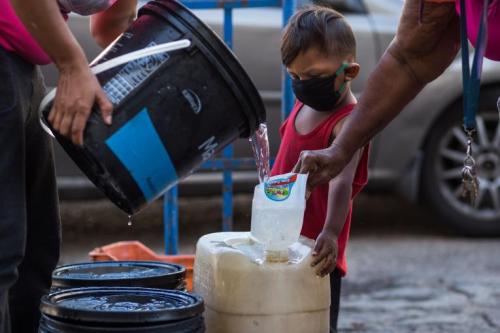UNICEF appeals for $1.6 billion to meet growing needs of children impacted by COVID-19 pandemic
New funding request is $1 billion more than March appeal, as countries reel from socioeconomic impact of COVID-19
UNICEF is appealing for US$1.6 billion to support its humanitarian response for children impacted by the COVID-19 pandemic, up from $651.6 million requested in a similar appeal late March. This increase reflects the devastating socioeconomic consequences of the disease and families’ rising needs. As the outbreak enters its fifth month, the costs for supplies, shipment and duty of care are increasing dramatically.

A child wearing a face mask due to the COVID-19 pandemic watches water being poured into a container in Caracas.
“The pandemic is a health crisis which is quickly becoming a child rights crisis,” said UNICEF Executive Director Henrietta Fore. “Schools are closed, parents are out of work and families are under growing strain. As we begin to reimagine what a post-COVID world would look like, these funds will help us respond to the crisis, recover from its aftermath, and protect children from its knock-on effects.”
Access to essential services like health care and routine immunization has already been compromised for hundreds of millions of children, which could lead to a significant increase in child mortality. Meanwhile, the mental health and psychosocial impact of restricted movement, school closures and subsequent isolation are likely to intensify already high levels of stress, especially for vulnerable children.
According to a UNICEF analysis, some 77 per cent of children under the age of 18 worldwide, or 1.8 billion, are living in one of the 132 countries with some form of movement restrictions in place due to COVID-19.
Risk factors for violence, abuse and neglect are on the rise for children living under restricted movement and socio-economic decline. Girls and women are at increased risk of sexual and gender-based violence. In many cases, refugee, migrant and internally displaced children, as well as returnees, are experiencing reduced access to services and protection and increasing exposure to xenophobia and discrimination.
“We have seen what the pandemic is doing to countries with developed health systems and we are concerned about what it would do to countries with weaker systems and fewer available resources,” said Fore.
UNICEF is focusing its response to the pandemic on countries with existing humanitarian crises – working both to prevent transmission and mitigate the collateral impacts on children, women and vulnerable populations, especially around access to health, nutrition, water and sanitation, education and protection.
UNICEF has so far received US $215 million in support of its response to the pandemic. Additional funding will help UNICEF build upon results already achieved which include:
• Over 1.67 billion people reached with COVID-19 prevention messaging around hand washing and cough and sneeze hygiene;
• Over 12 million people reached with critical water, sanitation and hygiene supplies;
• UNICEF has shipped more than 6.6 million gloves, 1.3 million surgical masks, 428,000 N95 respirators, 291,000 gowns, 13,000 goggles, 63,500 face shields, 200 oxygen concentrators and 34,500 diagnostic tests for COVID-19, in support of 52 countries as they respond to the pandemic;
• Nearly 80 million children reached with distance or home-based learning;
• Over 10.9 million children and women receiving essential healthcare services in UNICEF supported facilities; and
• Over 830,000 children, parents and caregivers provided with community-based mental health and psychosocial support.
Source:UNICEF
- 222 reads
Human Rights
Ringing FOWPAL’s Peace Bell for the World:Nobel Peace Prize Laureates’ Visions and Actions

Protecting the World’s Cultural Diversity for a Sustainable Future

The Peace Bell Resonates at the 27th Eurasian Economic Summit

Declaration of World Day of the Power of Hope Endorsed by People in 158 Nations

Puppet Show I International Friendship Day 2020

